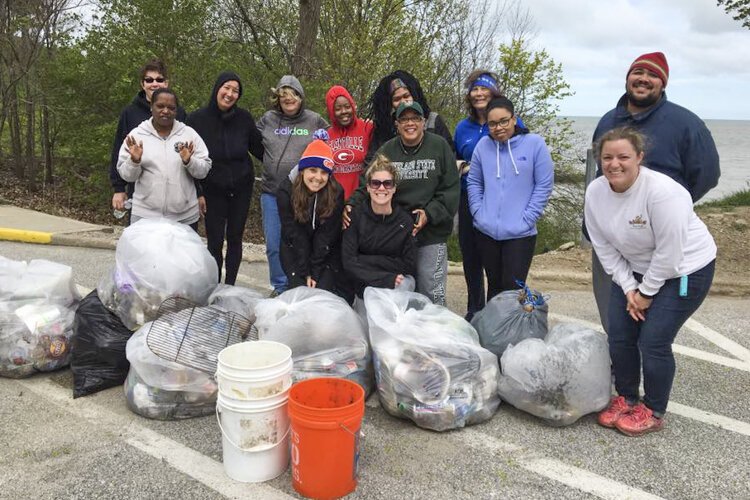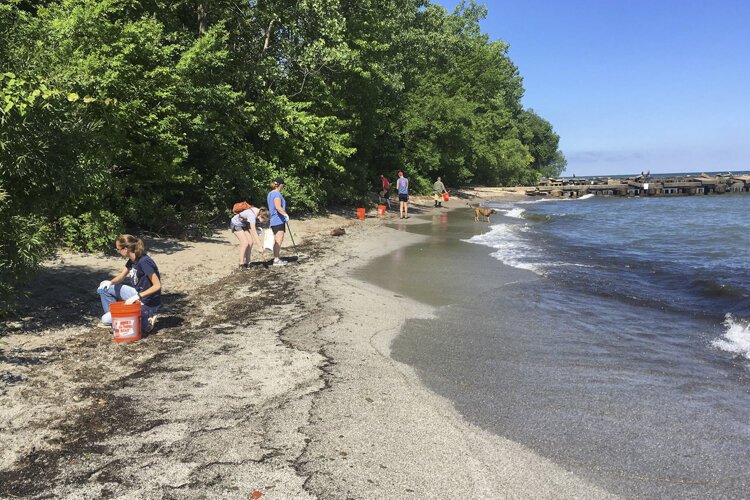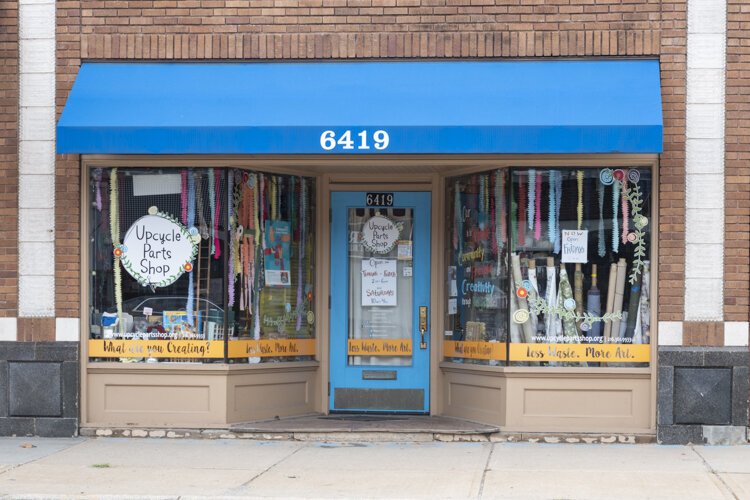Ripple effects of Sustainable Cleveland 2019 spread across city
If you have ever been to a professional conference, you know the usual drill: a quasi-hokey theme that loosely binds together some disconnected workshops, sometimes with a semi-encouraging speaker addressing the nametagged throngs assembled before them. At worst, these conferences are a mandatory waste of time. At best, they can provide motivation to take home with you, even if such inspiration proves fleeting.
Not so with Sustainable Cleveland 2019.
For the past 10 years, the summit has been defying any and all professional conference expectations by serving as an incubator for bold and creative efforts that have substantively changed Cleveland’s environmental landscape. First convened in 2009 with more than 600 participants representing government, nonprofits, media, education, and business, the summit was designed to envision a “bright green city on a blue lake” and to take action to make that happen by 2019, the 50-year anniversary of the 1969 Cuyahoga River fire.
 To be clear, the summit's name each year has been Sustainable Cleveland 2019. Yet though we have now reached the very year in the title, there are no plans for this to be the ultimate summit; plans are for the event to continue in future years as efforts focus on accelerating progress in a few key areas, albeit possibly under a different conference name.
To be clear, the summit's name each year has been Sustainable Cleveland 2019. Yet though we have now reached the very year in the title, there are no plans for this to be the ultimate summit; plans are for the event to continue in future years as efforts focus on accelerating progress in a few key areas, albeit possibly under a different conference name.
Dubbed the “Year of People,” this year’s gathering is focused on the engagement and empowerment of the citizens who have helped transform Cleveland into the current system of stakeholders actively working on climate change and other sustainability topics.
In honor of this culminating year of the summit, we spoke with leaders of various initiatives that were formed out of the energy of the original summit and continue to make a significant and lasting difference to support a healthy future of our local ecosystem.
Commercial Success
One of the cornerstones of the summit, known as SC2019, has been its working groups: collections of individuals committed to action on a particular topic. In 2010, one of the original working groups was focused on the goal of reducing the energy consumption of commercial buildings. For inspiration, the group turned to an initiative called “2030 District” that had just launched in Seattle.
“We decided to call over to the Seattle group to say “We love what you’re doing. How do you do it?” says Cynthia Cicigoi, an original member of that working group.
 From there, Cleveland 2030 District was born. The nonprofit assists commercial buildings in both the downtown area and University Circle areas to reduce their energy and water consumption and CO2 emissions from transportation, all with a goal of a 50% reduction by the year 2030. Though 22 of these districts now exist across North America, Cleveland takes great pride in being the second one established.
From there, Cleveland 2030 District was born. The nonprofit assists commercial buildings in both the downtown area and University Circle areas to reduce their energy and water consumption and CO2 emissions from transportation, all with a goal of a 50% reduction by the year 2030. Though 22 of these districts now exist across North America, Cleveland takes great pride in being the second one established.
With north of 280 buildings participating, representing more than 59 million square feet, Cleveland 2030 District is boasting some incredible results. According to their recently published 2018 Progress Report, their properties collectively on average have reduced their energy consumption by 24% from baseline. This includes a reduction of water usage by 21% from baseline and a reduction of transportation emissions by 25% from baseline. With the 2030 District goals for 2020 calling for an overall 20% reduction, Cleveland has met and exceeded the 2020 milestone goals.
“Ours is a voluntary program, so it speaks highly of the members of our community who have come to say that yes, we need to do this, and yes, this is important,” says Cicigoi, now the executive director of Cleveland 2030 District. “We really did grow out of that first summit, and we are proud to be a continuation of that work.”
 Cycle of ReUse
Cycle of ReUse
Sometimes, ideas need to start out on a grand scale before they become something more doable. That was the case with Upcycle Parts Shop, a nonprofit retail shop that accepts donations and leftover materials for creative reuse by artists, makers, crafters, and teachers. Since their opening in 2014, they have diverted 26.5 tons of materials.
“That’s multiple elephants and t-rexes,” says Nicole McGee, Upcycle co-founder and executive director.
Though Upcycle might be a small storefront, the original idea discussed at SC2019 in 2010 was much bigger.
“Our first idea in the working group was called Wasteapedia,” says McGee. “We had this audacious goal to convert an old brick warehouse into a space where reuse would be the function.”
Though Wasteapedia was a bit too big of a concept to move forward, McGee latched onto the small piece of the creative use center. After a few seasons of short-term pop-up shops where upcycle artists came together to sell their wares, McGee leveraged the networking and conversations from SC2019 to ultimately open the doors to the 900-square-foot storefront at 6419 St. Clair Ave.
McGee is quick to credit SC2019 with helping to spread the word about the daily feats of creative use at her shop. Though the summit is an annual opportunity to hear about specific efforts to create and support sustainable practices, it is the people that keep her coming back year after year.
“There are great speakers, but I’m not really there for them,” laughs McGee. “For me, it’s all about being able to talk to wonderful people who support wonderful people.”

Water Works
The resulting efforts of SC2019 stretch far beyond the borders of Cleveland, and even thousands of miles beyond Ohio. For Erin Huber Rosen, it’s all in the name of water.
“When I went to the first summit, one of the working groups was focused on water,” Rosen says. “I gravitated toward a leadership role, and things just sort of took off for me from there.”
That original working group of 60 sitting in the corner talking about water was eventually reduced to around 10 passionate individuals who met regularly after the summit concluded.
“Very quickly we wanted to solve all the problems with Lake Erie,” says Rosen. “We realized that we were 10 community people who care about our lake and are tired of it being inaccessible and dirty.”
 Drink Local. Drink Tap beach and lakefront volunteers at Perkins Beach.Their focus turned to plastic pollution and promoting both tap water and Lake Erie. Realizing that no one was celebrating World Water Day—a United Nations observance—the group marched on Euclid Avenue on March 22, 2010, with signs to rally people around not using plastic. That resulted in Drink Local. Drink Tap., a nonprofit that inspires people to recognize and solve our water issues through creative education, events, and providing safe water access to people in need. Their actions include everything from collecting 6,861 pounds of trash over the years from Edgewater Park to providing 24,148 Ugandans with safe water.
Drink Local. Drink Tap beach and lakefront volunteers at Perkins Beach.Their focus turned to plastic pollution and promoting both tap water and Lake Erie. Realizing that no one was celebrating World Water Day—a United Nations observance—the group marched on Euclid Avenue on March 22, 2010, with signs to rally people around not using plastic. That resulted in Drink Local. Drink Tap., a nonprofit that inspires people to recognize and solve our water issues through creative education, events, and providing safe water access to people in need. Their actions include everything from collecting 6,861 pounds of trash over the years from Edgewater Park to providing 24,148 Ugandans with safe water.
Ten years later, Rosen acknowledges that her role in SC2019 has changed. Whereas she once sat at the table and took the lead, she is now content to give others the space to do exactly as she has been able to do. Still, she stands at the ready to encourage anyone with an idea to get involved.
“There’s still so much more work to be done,” says Rosen. “If you’re interested in getting more involved in the Cleveland community as a whole, there is something for you at the summit.”
The Sustainable Cleveland 2019 Summit will be held Wednesday, Oct. 16, at the Cleveland Public Auditorium. More information is available on their website.
This feature story is part of our dedicated series titled "People, Planet, Progress: A Decade of Sustainable Cleveland" in partnership with Sustainable Cleveland. See the other stories in our series here.

About the Author: Ken Schneck
Ken Schneck is the Editor of The Buckeye Flame, Ohio’s LGBTQ+ news and views digital platform. He is the author of Seriously…What Am I Doing Here? The Adventures of a Wondering and Wandering Gay Jew (2017), LGBTQ Cleveland (2018), LGBTQ Columbus (2019), and LGBTQ Cincinnati. For 10 years, he was the host of This Show is So Gay, the nationally-syndicated radio show. In his spare time, he is a Professor of Education at Baldwin Wallace University, teaching courses in ethical leadership, antiracism, and how individuals can work with communities to make just and meaningful change.




